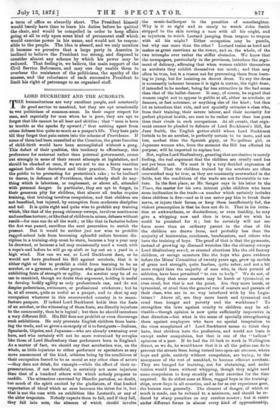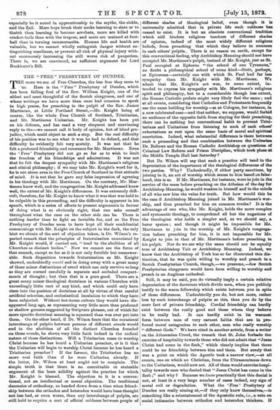LORD BUCKHURST AND THE ACROBATS.
TEIE humanitarians are very excellent people, and constantly do good service to mankind, but they are apt occasionally to vex politicians of common-sense. In their eager respect for man, and especially for man when he is poor, they are apt to forget that life cannot be all beer and skittles; that "man is born fo trouble as the sparks fly upward ;" that nothing apart from crime debases him quite so much as a pauper's life. They hate pain till they forget that pain enters into the scheme of Providence. If some of them had been consulted at the Creation, the great function of child-birth would have been accomplished without a pang. This defect of their qualities, this tendency to effeminacy, this preference for maternal rather than paternal government, comes out strongly in some of their recent attempts at legislation, and should be checked at once, if we are not to see a fierce reaction against both their doctrines and their practice. They seem to the public to be protecting for protection's sake ; to be inclined to decree, in defiance of Providence, that nobody shall do any- thing which is laborious, or unpleasant, or above all, attended with personal danger. In particular, they are apt to forget, in their generous pity for children, that almost all trades require training, that training involves compulsion, and that children are not benefited, but injured, by exemption from moderate discipline and toil. It is quite right and quite wise to prohibit any training which, like that of the young chimney-sweeps, involves continuous and needless torture; or like that of children in mines, debases without result—for men can do all the work ; or like that in factories before the Act was passed, sacrifices the next generation to enrich the present. But it would be neither just nor wise to prohibit ragged-school lads from becoming splendid sailors because dis- cipline in a training-ship must be stern, because a boy a year may be drowned, or because a lad may occasionally need a touch with a rope's-end before he will go up aloft or lay out on a yard in a high wind. Nor can we see, as Lord Buckhurst does, or he would not have produced his Bill against acrobats, that it is either right or fair to prohibit a child from learning to be an acrobat, or a gymnast, or other person who gains his livelihood by exhibiting feats of strength or agility. An acrobat may be of no use to mankind, though we doubt that argument, holding it useful to develop bodily agility as only professionals can, and do not despise pedestrians, swimmers, or professional cricketers ; but he is, at all events, quite as useful as a pauper, and to shut up any occupation whatever in this overcrowded country is to manu- facture paupers. If indeed Lord Buckhurst holds that the feats of an acrobat, or the witnessing of those feats, are directly injurious to the community, then he is logical ; but then he should introduce a very different Bill. His Bill does not prohibit or even discourage such exhibitions. He only prevents English children from learn- ing the trade, and so gives a monopoly of it to foreigners—Italians, Spaniards, Gipsies, and Japanese—who are already swarming over here, and who certainly will not be more restrained by scruples like those of Lord Shaftesbury than performers born in England. As a matter of fact, we should say that acrobatiam was, on the whole, as little injurious to either performer or spectators as any mere amusement of the kind, athletes being by the conditions of their occupation forced to be as moral as any other class of actors
—they dare not drink, for example—while the effect of their re- presentations, if not beneficial, is certainly not more injurious than that of a hundred others with which nobody proposes to meddle. The attraction exercised by Blondin partakes, no doubt, too much of the spirit excited by the gladiators, of that hushed expectation of blood which so soon becomes the thirst for it, but that is not the case with an exhibition like Leotard's, or any of the abler trapezists. Nobody expects them to fall, and if they fall, they fall into nets, the absence of which shodld involve the music-hallkeeper in the penalties of manslaughter. Why is it so right and so manly to watch John Smith stripped to the skin rowing a race with all his might, and so injurious to watch Leotard jumping from trapeze to trapeze with all his might? Either occupation may be puerile, but why one more than the other ? Leotard trains as hard and makes as great exertions as the rower, and on the whole, of the two triumphs over rather the stiffer obstacles. We know that the newspapers, particularly in the provinces, introduce the argu- ment of delicacy, affirming that when women exhibit themselves as acrobats they exhibit themselves too much ; and that may often be true, but is a reason not for preventing them from learn- ing to jump, but for insisting on decent dress. To say the dress is necessarily indecent because it is tight is untrue, the tight dress, if intended to be modest, being far less attractive in the bad sense than that of the ballet-dancer. It may, of course, be argued that women ought not to appear in public at all, either as acrobats, or dancers, or fast actresses, or anything else of the kind ; but then let us introduce that rule, and not specially ostracise a class who, from their training, their severe labour, and their necessity for perfect physical health, are sure to be rather more than less pure than their rivals in such occupations. At all events, that argu- ment cannot be pleaded in defence of Lord Buckhurst's Bill, for Jane Smith, the English gutter-child whom Lord Buckhurat forbids to be an acrobat, is perfectly certain to be more, and not less, modest than the Spanish gipsy, or Neipolitan girl, or Japanese woman who, from the moment the Bill has effected its purpose, will be imported to replace her.
But, replies Lord Shaftesbury, granting that acrobatism is merely fooling, the real argument that the children are cruelly used has not yet been met. We meet it by a very decided expression of disbelief. That the children trained by the acrobats are often. overworked may be true, as they are constantly overworked in the fields, but the conditions of the trade are not favourable to tor- ture. In the first place, as Mr. Sanger says in his letter to the Times, the master for his own interest picks children who have- some inclination to the trade—a number which certainly includes three children in five—and as it can never pay him to break their nerve, or injure their forms, or keep them insufficiently fed, the-
violent presumption is that he does not do it. That in his irrita- tion at awkwardness, or disobedience, or even timidity, he may give a whipping now and then is true, and we wish he could be punished for it ; but he certainly will not use force more than an ordinary parent in the class of life the children are drawn from, and probably less than the majority of boatswains, coachmen, bandmasters, and others who have the training of boys. The proof of that is that the gymnasts, instead of growing up diseased wretches like the chimney-sweeps Lord Shaftesbury saved, or stunted abortions like the old factory children, or savage monsters like the boys who gave evidence before the Mines' Committee of twenty years ago, grow up mode)s of grace and strength, quite fearless, quite sober, and not a bit more stupid than the majority of men who, in their pursuit of athletics, have been permitted "to run to body." We do not, of
course, deny that some masters may be harsh or tyrannical, or
even cruel, but that is not the point. Are they more harsh, or tyrannical, or cruel than the general run of masters and parents of their class, who are in no way interfered with by the Legis- lature? Above all, are they more harsh and tyrannical and cruel than hunger and poverty and the workhouse ? To strengthen the laws against cruelty to children may be ad- visable—though opinion is now quite sufficiently imperative in that direction—but what is the sense of specially strengthening them against employers who have no special temptation to the vices complained of ? Lord Buck hurst seems to think they have, that children hate the profession, and would not learn it except under compulsion, but that is one of the "balloon opinions of a peer. If be had the ill-luck to work in Wellington Street, as we do, he would know that it is all the police can do to prevent the streets from being turned into open-air circuses, where boys and girls, entirely without compulsion, are trying, to the annoyance of the rest of mankind, to become efficient acrobats. They are banged for learning, not for abstaining, and under tuition would learn without whipping, though they might need some compulsion to keep steadily at their exercises for the time required. So do eldest sons at Eton, ragged boys in the training- ships, crow-boys in all counties, and as far as our experience goes, the human race generally. The element of danger, of which so much is made, can be reduced to a minimum, and should be re- duced by sharp penalties on any careless master ; but it exists under different forma in almost every kind of apprenticeship, especially be it noted in apprenticeship to the scythe, the sickle, and the flail. More boys break their necks learning to elate or to thatch than learning to become acrobats, more are killed with cricket-balls than with the trapeze, and more are maimed at foot- ball than in turning summersaults. Human life and health are valuable, but we cannot wholly extinguish danger without ex- tinguishing manliness, or prevent all risk of physical injury with- out enormously increasing the still worse risk of pauperism. There is, we are convinced, no sufficient argument for Lord Buckhurst's Bill.



































 Previous page
Previous page